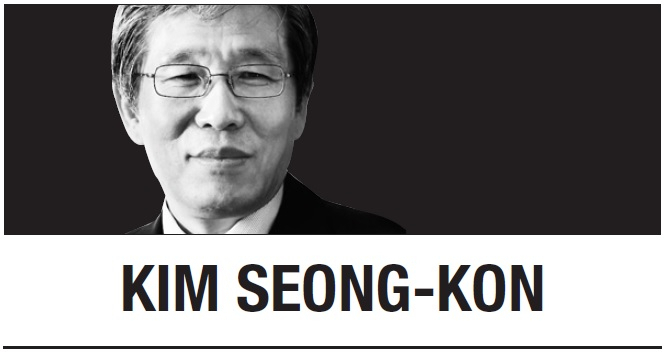
We all grow up listening to our grandmother’s stories. Sometimes these are folktales and other times historical events she witnessed and experienced. In that sense, a grandmother is not only a superb storyteller, but also an indispensable history teacher.
Recently, the 90-year-old author Oh Duck-choo sent me a collection of autobiographical essays entitled, “Memoirs of the Times.” Published by Girok-yeon, which is probably an acronym for the Research Institute of Archives, the subtitle of the book was “My Story and Our History for My Great-grandchildren.” It was a fascinating read: Oh was born during the Japanese occupation and entered adolescence during the whirlwinds of the liberation, the division of the Peninsula and the Korean War.
After studying at Seoul National University during wartime, Oh pursued her academic career in the US, at Stephen’s College in Missouri, The University of Illinois at Urbana-Champaign, and Columbia University in New York City. Following these educational experiences, Oh returned to Seoul, and she celebrated her ninetieth birthday recently. Thus, she is a living history of modern Korea, who is entitled to write “Memoirs of the Times.”
Reading her memoirs, I strongly felt that we should have more of these kinds of memoirs rooted in oral history, as they are not only invaluable historical sources but also important social documents. As the subtitle of Oh’s book suggests, those documents can teach history vividly and correctly to the next generation. It is important for our descendants to know history properly because there are so many corrupt, altered versions of our history written by ideology-oriented radical historians.
In her preface titled, “We All Are a Transmitter of History,” the author wrote that she would continually publish a series of memoirs in order to pass history onto her great-grandchildren, so they could remember what had happened in the past. She said that it was her grandmother, not her history teachers, who taught her that the Russo-Japan War broke out due to the power struggle over colonizing pre-modern Korea. Therefore, she wishes to continue the great tradition of grandmothers or great-grandmothers who teach the history they experienced to her offspring.
In her book, Oh recollected her elementary school years during the Japanese occupation. Through her reminiscence, the reader could peep into and understand the lives of the colonized Korean people under Japanese rule, especially during the Pacific War. Her recollections of the hard times raise a fundamental question: “How are those who were not even born during the Japanese rule even qualified to condemn those who actually endured those ordeals as pro-Japan people?”
In the above memoirs, Oh also wrote about her experience of studying in the US at a time when there were few Korean students at American universities. At Stephen’s College, she was the only Korean student, and at the University of Illinois, she was one of the 20 Korean students there. She was an outstanding student who received an Achievement Award from Stephen’s College and was selected as Homecoming Queen at the University of Illinois.
Even in a small town in Missouri, quite a few families sent their soldier sons to the Korean War and were often curious to learn as much as they could about the Korean Peninsula. Thus, they invited Oh for a talk about Korea and Korean culture. That was when she first found herself playing the role of a cultural ambassador, and she continues to occupy that role with her book.
In her memoirs, Oh wrote about her trips to Bhutan and Hawaii, two places that she loved dearly. Bhutan, a small Buddhist kingdom on the Himalayas’ eastern edge, fascinated her with exotic customs and spectacular landscapes. Hawaii embraced her warmly when she could not cope with the loss of her 32-year-old son due to illness. She said that the aboriginal beauty of the Big Island of Hawaii miraculously healed her otherwise incurable psychic wound.
Another intriguing thing is that in the poem, “In Memory of Chunwon,” Oh also reminisces about Yi Kwangsu, who was her neighbor. Her memory of Yi helps us appreciate the first modern Korean writer, who has been a victim of political ideology, wrongfully criticized by leftwing people as a pro-Japan person, and whose dedication to Korea’s independence has been woefully forgotten. Oh remembers Yi as a person who agonized over the grim future of his beloved country, which was colonized by Japan in the early twentieth century.
Since Oh stated that the above book of memoirs is the first of its series transmitting history, the reader can expect her second book. Perhaps, then, the reader can learn about things they cannot find in official history books. Regrettably, political ideologies have contaminated our history books, and we need to know the truth through the recollections of those who actually went through historical events and experienced them directly.
A grandmother’s or a great-grandmother’s “remembrance of things past” is always illuminating and inspiring.
Kim Seong-kon
Kim Seong-kon is a professor emeritus of English at Seoul National University and a visiting scholar at Dartmouth College. The views expressed here are the writer’s own. -- Ed.







![[Today’s K-pop] Blackpink’s Jennie, Lisa invited to Coachella as solo acts](http://res.heraldm.com/phpwas/restmb_idxmake.php?idx=644&simg=/content/image/2024/11/21/20241121050099_0.jpg)